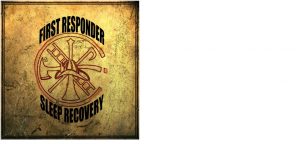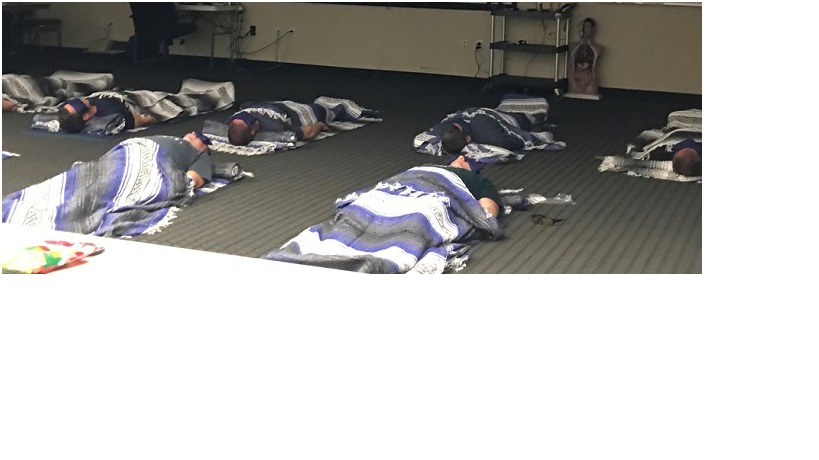Firefighter health should not be “collateral damage” from a career on the job. The inadvertent destruction from being addicted to awake is one of the greatest threats that firefighters face today. Recently, a chief told me he didn’t know if his members thought the topic of sleep was information worth learning. All I had to ask was, “Did you know sleep deprivation is medically linked to the leading killers of firefighters including heart attack, cancer, and suicide?” Let’s remember the time firefighters weren’t interested in wearing self-contained breathing apparatus, turning in gear to be washed for cancer prevention, or quitting the era of smoking in the firehouse. This speaks volumes to our resistance toward firefighter health and wellness. It is our chiefs’ responsibility to pave the way for valuable information and training to reach the department, which will have a lasting impact on their members’ lives.
Sleeping for Your Life
The hard truth is that almost 40 percent of firefighters suffer from a sleep disorder. According to a screening of 6,933 firefighters, 80 percent of those who tested positive had no prior awareness or previous diagnosis of their condition. This one study, conducted by Laura K. Barger, Ph.D., instructor in medicine at Harvard Medical School, alone may have saved 2,219 firefighter lives! Whether firefighters have interest in learning about sleep doesn’t change the dire matter: sleep deficiency is a health-wrecking problem that needs to be addressed. Once we acknowledge the problem, we can implement solutions to mitigate sleep deprivation and lower the risks for heart attack, cancer, and more.
Normalizing chronic sleep loss is a mortal addiction; it is taking out our members one life at a time. A chronic lack of sleep 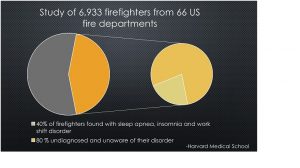 contributes to various biological changes that ultimately lead to disease development, independent of primary sleep disorders. Dr. Faith S. Luyster of the American Academy of Sleep Medicine and Sleep Research Society states that chronic sleep deficiency is causal in the development and exacerbation of cardiovascular and metabolic diseases and, ultimately, a shortened life span. Let’s bring to light to this fatal issue to create a call to action to initiate a direct conversation that, no matter what rank you serve as, challenges the status quo on how sleep is undervalued in the world of firefighting and the real things we can do to improve it.
contributes to various biological changes that ultimately lead to disease development, independent of primary sleep disorders. Dr. Faith S. Luyster of the American Academy of Sleep Medicine and Sleep Research Society states that chronic sleep deficiency is causal in the development and exacerbation of cardiovascular and metabolic diseases and, ultimately, a shortened life span. Let’s bring to light to this fatal issue to create a call to action to initiate a direct conversation that, no matter what rank you serve as, challenges the status quo on how sleep is undervalued in the world of firefighting and the real things we can do to improve it.
Running calls while the rest of the world is asleep is inherently part of the job. No schedule preference will alter the nature of the emergency services. But I am not here to debate whether a 24-or 48-hour schedule is better. I am not here to debate factors out of our control (night runs). I am here to inform on a rising health crisis and to spread awareness that sleep loss is not an insurmountable problem. There are surprisingly viable, proven solutions that we can implement within the demands of any firefighter schedule to mitigate the effects of sleep deprivation and improve the quality of sleep you receive on or off shift, regardless of how little it is.
Before we can fix any sleep condition, we first must admit there is a problem. We explicitly deny it, convince ourselves we don’t need it, and power through. But on some level, we all know we need sleep. That said, it is difficult to achieve the adequate sleep we need 1) from the inevitable night runs and factors in personal family life, and 2) because we are immersed in a culture that deems sleeping an indulgent, sinful activity at best.
We’ve all heard the phrase, “You snooze, you lose” or “I’ll sleep when I’m dead”? How about “I’ll be fine with just one more cup of coffee”? We might as well be pumped full of an intravenous diet of stimulants. We live in a society that glorifies activity over restoration to the point that we wear the dark circles under our eyes like a badge of honor. It’s too bad our stimulated culture doesn’t inform us of what Professor Matthew Walker, director of the University of California—Berkeley’s Centre for Human Sleep Science, states: “No aspect of our biology is left unscathed by sleep deprivation. Sleep is the greatest legal performance enhancing drug that most people are probably neglecting.” Point is, if you’re getting less than six hours of sleep per night, your testosterone decreases, your time to physical exhaustion drops by up to 30 percent, the ability of your lungs to expire carbon dioxide and inhale oxygen decreases, and the less sleep you have, the lower your peak muscular strength will be. Who needs sleep to be an effective firefighter, right?
Have you ever wondered why firefighters become statistics to cancer, suicide, heart attack, and metabolic illnesses? For those of us asking these hard questions, our attention is focused merely on external influences, yet the underlying cause is rarely to never addressed. We all know the leading causes of firefighter death are cancer, heart attack, and suicide. However, a growing body of medical research points in another direction: sleep deprivation. For far too long, we’ve been blaming the fire when the house burns down, but we continue to ignore the arsonist holding the match. The arsonist behind countless firefighter deaths is sleep deprivation.
Although exposures and other variables certainly contribute to health issues like cancer, not treating the underlying cause is a fundamental flaw of how our society functions—treat the symptom and not the disease; basically, fix it after it’s broken. My goal is to provide solutions before it is too late. However, I am going up against a culture that is expected to readily profit the global energy drink industry $84.8 billion by 2025. Addicted to being awake – profitable yet so costly. The cost comes in the cascading effects of being awake for too long, and that leave our bodies with a lowered immune response, hormones that are in disarray, and a cardiovascular system under extreme pressure. These effects accumulate into chronic illness and disease and are a ticking time bomb for how long we will last. Let’s look at the real-life consequences of what it means to be addicted to awake.
Cancer, Cardiac Arrest, Suicide
The likelihood of a firefighter getting cancer goes up exponentially when the individual is sleep deprived. According to the International Journal of Cancer, sleep deprived women have a 40 percent increased risk of breast cancer, and sleep deprived men have a 50 percent increased risk of prostate and colorectal cancer. This could be because after just one night of sleeping just four or five hours, the body’s natural killer cells (“anti-cancer” cells), drop in count by 70 percent. A cancer research center in Seattle, Washington, found that people who slept less than six hours per night before their cancer diagnosis were 1½ times more likely to die from the disease than people who slept 7-8 hours per night. Furthermore, the World Health Organization has officially classified shift work a probable carcinogen.
In forced wakefulness, whether it is staying up to watch a movie or scroll social media, the artificial blue lights, specifically blue spectrum light at night, to which we are exposed disrupt our hormone levels and cause a serious suppression of our sleep hormone: melatonin. However, melatonin is not only a circadian hormone; it has recently been found to play a key role in the body’s defense against cancer. Simple mindfulness of nighttime use of fluorescent lights, TV screens, and cell phones can greatly impact our biology. Congruently, darkness and dim or red lighting during evening hours will help boost melatonin production as well as consume melatonin-promoting foods or drinks such as tart cherry juice. This is just one simple way our environment and nutrition can support the body’s natural defense system.
Every time we sleep we undergo an emotional reset. Have you ever noticed feeling grumpy the day after no sleep? Tolerance for any disturbance goes down after a long night awake. This is likely because of a lack of rapid eye movement (REM) sleep, the last phase of the 90- to 110-minute sleep cycle through which we should rotate multiple times each night. The REM phase is responsible for processing emotionally heightened events. Because it is the last phase, firefighters are susceptible to never entering that stage of sleep when running calls frequently, such as every 45 to 60 minutes at night. As an individual becomes sleep deprived, the brain’s center for rational decision making turns off. When the prefrontal cortex switches off, the emotional centers of the brain become dysregulated and are over taken by impulsive, irrational behavior. This puts a chronically sleep-deprived individual at a higher risk for suicidal ideation. This is why we should be doing everything we can to improve sleep latency (the time it takes to fall asleep) and enhance sleep efficiency (the quality of sleep we experience).
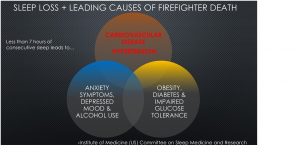
Research by Michael Perlis, Ph.D., a professor at and director of the Pennsylvania Behavioral Sleep Medicine Program, finds that completed suicides are far more likely to occur at night between the hours of midnight and 4:00 a.m. He states, “Sleep disturbance has consistently been found to be a risk factor for suicidal ideation and behavior,” and explains that, “It is likely that being awake at night, when one is biologically prepared to be asleep, may be a risk factor in and of itself. The risk is that at this phase of the 24-hour day we all may be particularly vulnerable to catastrophic thinking and low impulse control.”
So, what about cardiac issues relating to sleep? Studies show that if you sleep for less than six hours per night, you’ll have a 200 percent increased risk of experiencing a fatal heart attack. The University of Texas’s Southwestern Medical Center studied a group of participants with decreased sleep. Researchers concluded that little sleep equates to negative health outcomes such as all-cause mortality, obesity, diabetes, cardiovascular disease, and impaired vigilance and cognition. This coincides with Barger’s research which found that the firefighters who screened positive for a sleep disorder were more likely to report having cardiovascular disease, diabetes, depression, and anxiety, and report poorer health status than those who did not screen as positive. Barger identified sleep apnea as the primary sleep disorder from which firefighters suffer. Note that over an eight-year period, men with severe sleep apnea are 58 percent more likely to develop congestive heart failure, linking the connection between poor sleep and heart health.
So, what causes sleep apnea, and how do we prevent it? Although weight issues are often cited as a reason, weight gain is often caused by the chronic state of fight-or-flight, cumulative effects of stress paired with circadian disruption. This heightened state of alarm causes excess production of the hormone cortisol, which leads to visceral abdominal fat, a proven indicator of heart health problems down the road. So, the key question is: how do firefighters lower their cortisol levels?
Your immediate ideas for solutions may be exercise and nutrition, but there is one more vital component to add to our routines. It is absolutely imperative that firefighters commit to proactive practices that engage the parasympathetic nervous system to take our bodies out of the extenuating fight-or-flight state and to counter the effects of adrenaline dumps from running calls through the night. In other words, we need to relax! However, we are not talking about relaxation in the way most people do. Most of us don’t even know what true relaxation is because it has been so long since we have experienced it. The relaxation practices we teach are training, similar to the same way you would expect results from a lifting routine at a gym. They take just a few minutes to slow the heart rate and engage a parasympathetic response to relax the body and restore adrenal function; results are consistent with commitment.
Many firefighters with whom we work are in such a chronic state of fight-or-flight that they say after their first Sleep Recovery Practice™ experience that it was the first time they felt relaxed in years. Some revealed they were skeptical at what we had to offer and admit they were surprised by how well it helped them, so much so that they end up sharing it with family members. Practices that relax the body and engage the parasympathetic nervous system are vital for restoring our health and returning circadian rhythms back to a normal pattern. One relaxation technique we teach in the training is a deeply relaxing meditation method that was studied by the United States Department of Defense on veterans who suffer from post-traumatic stress disorder, anxiety, depression, and sleep disorders. It was found so effective that the U.S. Surgeon General endorsed it. We have tailored this specific type of meditation for first responders, and firefighter test groups tailor this transformative program to firefighter culture, not only so that it is well received but so that it has the most impact.
You will die faster from sleep deprivation than starvation. We value eating, so no matter how busy our schedules become, 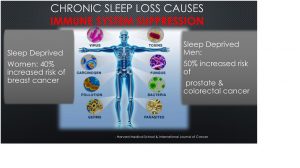 crews make time to sit down and eat. Yet, when our schedules become grueling, the first thing sacrificed is sleeping adequately or enforcing a n ap. The glorification of “powering through” on three hours needs to stop! Worse, even when we have downtime, the activities we often choose as a culture compromise our body’s natural ability to sleep when it finally comes time.
crews make time to sit down and eat. Yet, when our schedules become grueling, the first thing sacrificed is sleeping adequately or enforcing a n ap. The glorification of “powering through” on three hours needs to stop! Worse, even when we have downtime, the activities we often choose as a culture compromise our body’s natural ability to sleep when it finally comes time.
Three Steps Toward Sleep Improvement
There seems to be a grave, silent admittance to the onset of these terminal health conditions, treated as some sort of side note after a long career as a pumperman, a truckie, or a technician. However, it does not have to be. There are effective, proven, and easy practices we can incorporate to dramatically change the trajectory of our careers and save lives. Who doesn’t want to sleep better, feel better, and have more energy?
Following are three ways to better our sleep habits. Make no mistake, sleep is not to be equated with poor work ethic. If you are in that mindset, you are part of the greater cultural problem: we are addicted to awake. Rest does not challenge work ethic, it optimizes it.
- Install red lights in every firehouse for evening use to support the circadian rhythm.
- Departments should ensure a daily rest and recovery time dedicated to unplugging, napping, or doing Sleep Recovery Practices™.
- Every leader, formal and informal, should shift the dialogue and attitude about rest, promoting sleep hygiene understanding that being rested optimizes performance.
It is time to break our cultural values that glorify this deadly addiction to being awake and begin to value sleep, naps, and healthy practices that support the circadian rhythm. In turn, there will be a substantial decrease in risk for cancer, heart attack, and propensity for psychological problems that lead to suicide. As we make these larger connections on sleep relating to health and we take action together, we must assert what we know to be true: healthy sleep habits do not challenge work ethic, but rather enable and support it, that valuing sleep is not weakness, and sleep deprivation is not strength.
The only way to reinforce the work ethic passed on through generations of the fire service, which is challenged by an ever-increasing call volume, is to optimize performance by implementing structured sleep recovery practices and regimens. These efforts to promote sleep wellness will undoubtedly save lives.
